- Homepage
- Herbs Spices
- Best Way to Use Turmeric
Best way to use turmeric
The best way to use turmeric is in small amounts daily in your cooking. The spice contains important lipophilic polyphenols meaning they need added fat to be absorbed; they are less likely to be effective in a tea for example as compared to a dish where olive oil is used to fry onions.
If you suffer from chronic joint pain, starting every morning with a few minutes of lower back exercises may not be enough. What you eat is vitally important too.
This is particularly true for those who have raised blood-glucose, remembering that half of all diabetics are totally unaware that they have a problem; until perhaps they become impotent or one of their legs goes lame.
Often what alerts the diabetic will be a sore near the ankle that won't heal; all is not well in the state of Denmark.
Quick guide
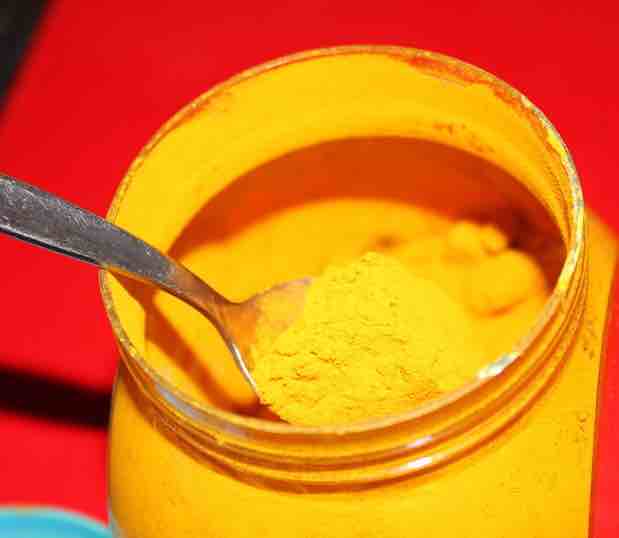
It's a complex problem but there are some simple things we can do to improve our immune-systems; and reduce the inflammation that may be affecting all of our organs, including our spines.
Don't take anti-inflammatory medication for prolonged periods as the pills have awful side effects but do include some turmeric daily in your cooking. It adds a marvellous flavour too.
Curcumin in turmeric
Turmeric is an orange-coloured spice that is a member of the ginger family. Curcumin is one of the active ingredients; there are certainly others less well studied.
Research reported in the Journal of Alternative and Complementary Medicine found that you cannot overdose the spice when taken in your food; and there are numerous studies confirming its anti-inflammatory properties as a Cox 2 inhibitor.
Turmeric protects the intestinal tract
Researchers writing in the American Association of Pharmaceutical Scientists[2] report that extensive studies stretching over fifty years have shown very promising results for many conditions, particularly those of the intestinal tract; from oral lichen planus in the mouth to gastric-ulcers. Those enjoying turmeric daily are less likely to suffer from colitis.
A rectal itch is not always a sign of worms; proctitis of the anus may respond to turmeric.
Turmeric helps keep blood glucose in diabetes in check
There are a host of blood glucose and autoimmune diseases, to mention a few
that will respond to the inclusion of turmeric in the diet. The
discussion is increasingly about using food as medicine; most type-2
diabetics can put their condition entirely into remission without having
to take drugs[7].
Prevention rather than treatment
More fascinating research published in the American Society of Pharmacognosy found that turmeric was effective in preventing joint-inflammation provided one started taking it before but not after the onset of pain[1].
This makes a strong case for using the spice daily in our food; prevention as always remains better than a cure.
Best way to use turmeric
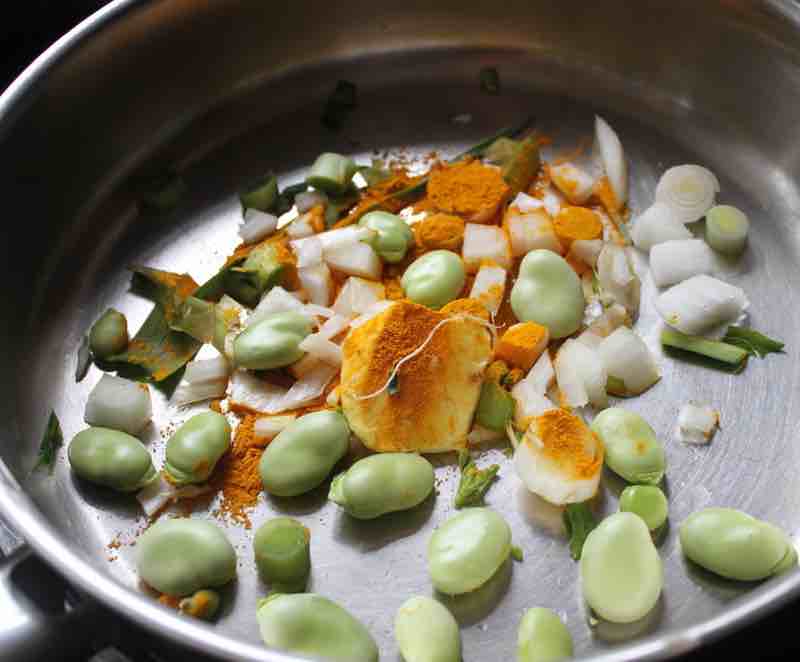 Eggs Hilton uses turmeric
Eggs Hilton uses turmericThe best way to use turmeric for me is half a teaspoon daily in our Eggs Hilton; it is so easy but in fact because of its benefits particularly for the diabetic we add it to many other dishes too. It is a small amount but imparts wonderful flavour to a breakfast that could otherwise become a little dull.
Mind you Eggs Hilton could never be as dull as most of the breakfast cereals; just why were corn flakes invented? Without large spoonfuls of sugar they are awful and fattening; and have far too much salt. Refined carbs have no taste; all the goodness has been removed including those nutrients that give them flavour.
We always add those greens and legumes that are in season. Today it's broad beans, leeks with freshly-picked kale and eggs to come. This is the breakfast that stays with you; it provides satiety. That means there will not be a need to reach for snacks and colas mid morning.
Turmeric modulates tumour pathways
Researchers discuss how curcumin modulates certain molecular pathways enabling it to help prevent tumours[3]. Doctors are now saying that it is no longer if but when we will get metastatic-disease; such is the toxic environment the world has created. The CEO of a large medical insurance company recently said that 80% of illness comes from our lifestyle. A much smaller fraction is genetic.
The stomach with its very low pH is a hostile environment for pathogens that enter via the nose or mouth; but the strong acid also inhibits the passage of many phytonutrients such as curcumin. It is widely believed though to my knowledge unproven that alcohol protects the passage of these substances to the small intestine and enhances their absorption.
This medicinal turmeric mead uses this belief to produce an exceptional elixir of life; it may just be an old Icarian wives' tale. The Greek island is renowned for beekeeping and brewing.
In short the best way to use turmeric to promote well-being and prevent disease is to enjoy it daily in our food; and perhaps drink too.
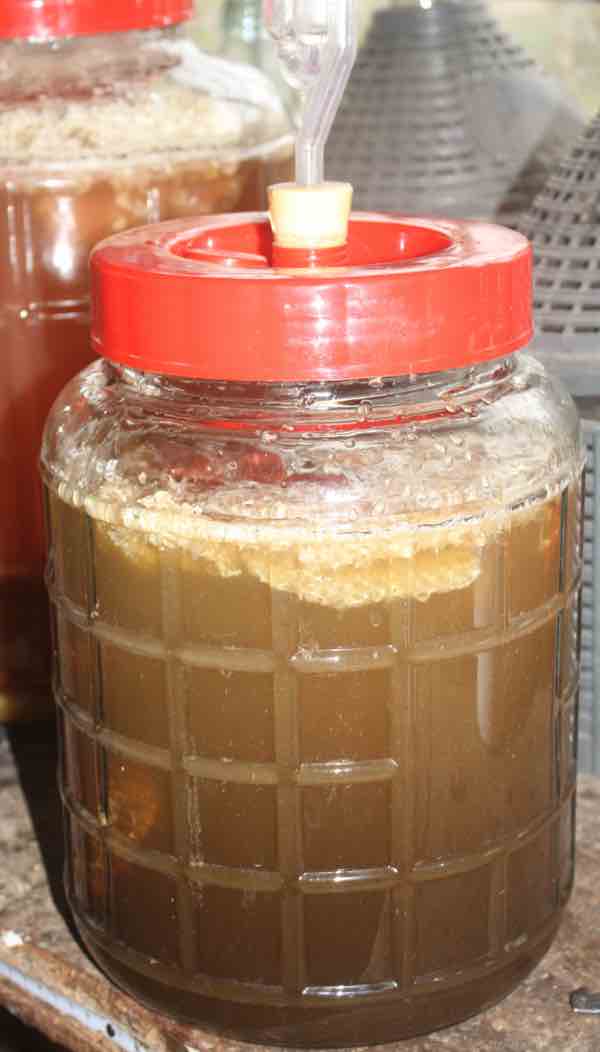 A carboy of fermenting turmeric mead
A carboy of fermenting turmeric meadFresh turmeric
Fresh turmeric grated from the root is far better than the powdered-form and really little trouble to grow in a mild climate. It tolerates some frost and is a good deal easier than its first cousin ginger. Used in a salve with raw honey it's one of the best treatments for bedsores at home.
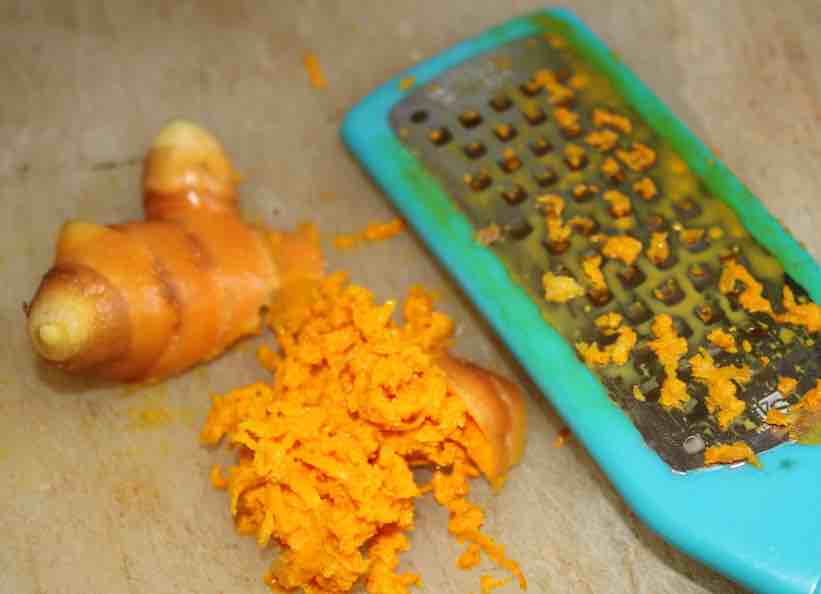
Beta-carotene in turmeric
That deep orange colouring is a sure sign of large amounts of beta-carotene, the precursor of vitamin A. Nearly 50 children die every single day in South Africa from a deficiency; mainly from viral infections like measles, severe diarrhoea and blindness.
Previtamin A would scientifically be a better term; it is cleaved in the cells of the gut and the liver to release this so-important nutrient. The best way to use turmeric is every single day in our cooking.
Statins and curcumin
One of the great concerns with statin-use is that it increases the likelihood of becoming diabetic and that it will progress to the need for insulin[4]; and experience "acute glycemic complications."
It would appear that patients treated with statins are prone to becoming insulin-resistant; researchers have found that curcumin modulates lipid pathways, significantly reducing total cholesterol and triglycerides[8].
What is clear is that the use of a spice like turmeric is a better way to help prevent these serious diseases of modern civilization; together with the avoidance of refined carbohydrate. That is the real cause of raised low-density cholesterol in any case, not eggs and butter.
South African children typically consume a cup of sugar per day, 48-teaspoons; and teenagers double that[5]. Is it any wonder that the prevalence of diabetes is soaring?
Furthermore there are numerous studies showing that added sugar reduces the absorption of many micronutrients including minerals such as calcium and iron; and vitamins too[6].
Twenty year diabetes rule
Dr Campbell's twenty year diabetes rule states that if you indulge in 20 tsp of sugar each day for two decades you will almost certainly begin to suffer from the disease; that is the amount in just a couple cans of a cola.
The Indian community in South Africa have confirmed that whilst they certainly enjoy the best way to use tumeric, Campbell's law still holds. If they also eat refined grains like white rice then it will happen sooner.
Then the 10 year diabetes rule kicks in; sugar and refined grains like polished rice and cake flour.
Whole grains contain large amounts of "resistant starch." Like fibre it is not digested in the small intestine stimulating the release of insulin but passes through to the colon; where instead it is fermented by the friendly flora producing not glucose but healthy short-chain fatty acids. Commercial milling and refining typically disables this benefit from wheat, corn and rice.
There is simply no way around it; avoid refined carbs and sugar or anticipate a life characterised by many visits to the doctor, umpteen pills and a lot of pain; and an early demise.
Dickie up dull foods
There are many important foods that nutritionally are profoundly necessary but frankly insipid or tasteless. Most legumes fall into this category as does one of our favourite cheap foods, the chaote squash.
The trick is to dickie up these foods with spices like turmeric, garlic and peppers.
Society has been tricked into believing that we need eat only those foods that tickle the taste buds; and so we are deficient in many phytonutrients, minerals and vitamins.
The best way to use turmeric is daily in our food making these dull foods more palatable; and simultaneously giving us protection against diabetes.
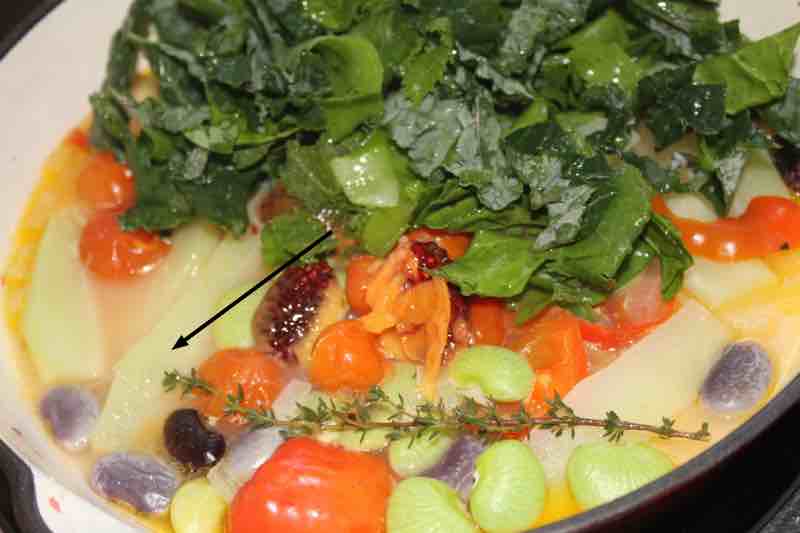 Dickie up dull foods with peppers, turmeric and thyme.
Dickie up dull foods with peppers, turmeric and thyme.Take home
The "take home" of all this is that diabetics and those suffering from generalised inflammation need to become better acquainted with herbs and spices; and eschew sugar and refined grains. The best way to use turmeric is fresh from your garden but the dried and powdered form is not bad.
 Turmeric nearly ready for harvesting.
Turmeric nearly ready for harvesting.Fascinating research reveals that by using food as medicine alone almost all type-2 diabetics can put their disease completely into remission without the use of drugs.
Autoimmune diseases and Postmenopausal hormone therapy
Postmenopausal women who use estrogen hormone therapy are 33% more likely to develop an autoimmune disease in the next 5 years[9]. That's enormous though the absolute risk remains remains relatively low.
Women with existing lupus must absolutely avoid HRT.
The scientists admit that it's a complex topic and that additional research is needed. One would hope that studies on the best ways to use turmeric might come into the equation. How are those taking the spice affected?
- Turmeric Extracts Containing Curcuminoids Prevent Experimental Rheumatoid Arthritis
- Therapeutic Roles of Curcumin: Lessons Learned from Clinical Trials
- Curcumin: A Potential Candidate in Prevention of tumours via Modulation of Molecular Pathways
- Association of Statin Therapy Initiation With Diabetes Progression
- Evidence to support a food-based dietary guideline on sugar consumption in South Africa
- Association between added sugar intake and micronutrient dilution: a cross-sectional study in two adult Swedish populations
- Using food as medicine
- Efficacy and safety of turmeric and curcumin in lowering blood lipid levels in patients with cardiovascular risk factors
- Modestly Increased Risk for Autoimmune Disease Linked to Menopausal Hormone Therapy
When browsing use right click and "Open Link in New Tab" or you may get a bad gateway signal.
The material expressed on this page is gleaned from the nutritional and environmental literature; it is clearly referenced. A plain distinction is made between the author's opinion and that which is scientifically proven. When in doubt consult your health professional.
To suggest a correction or clarification, write to Dr Bernard Preston here. Contact.
Newsletter
Our newsletter is entitled "create a cyan zone" at your home, preserving both yourself and Mother Earth for future generations; and the family too, of course. We promise not to spam you with daily emails promoting various products. You may get an occasional nudge to buy one of my books.
Here are the back issues.
- Lifestyle and ideal body weight
- What are ultra-processed foods?
- Investing in long-term health
- Diseases from plastic exposure
- Intensive lifestyle management for obesity has limited value
- A world largely devoid of Parkinson's Disease
- The impact of friendly bacteria in the tum on the prevention of cancer
- There's a hole in the bucket
- Everyone is talking about weight loss drugs
- Pull the sweet tooth
- If you suffer from heartburn plant a susu
- Refined maize meal and stunting
- Should agriculture and industry get priority for water and electricity?
- Nature is calling
- Mill your own flour
- Bake your own sourdough bread
- Microplastics from our water
- Alternative types of water storage
- Wear your clothes out
- Comfort foods
- Create a bee-friendly environment
- Go to bed slightly hungry
- Keep bees
- Blue zone folk are religious
- Reduce plastic waste
- Family is important
- What can go in compost?
- Grow broad beans for longevity
- Harvest and store sunshine
- Blue zone exercise
- Harvest and store your rainwater
- Create a cyan zone at your home
Did you find this page interesting? How about forwarding it to a friendly book or food junkie? Better still, a social media tick would help.
- Homepage
- Herbs Spices
- Best Way to Use Turmeric
Address:
56 Groenekloof Rd,
Hilton, KZN
South Africa
Website:
https://www.bernard-preston.com